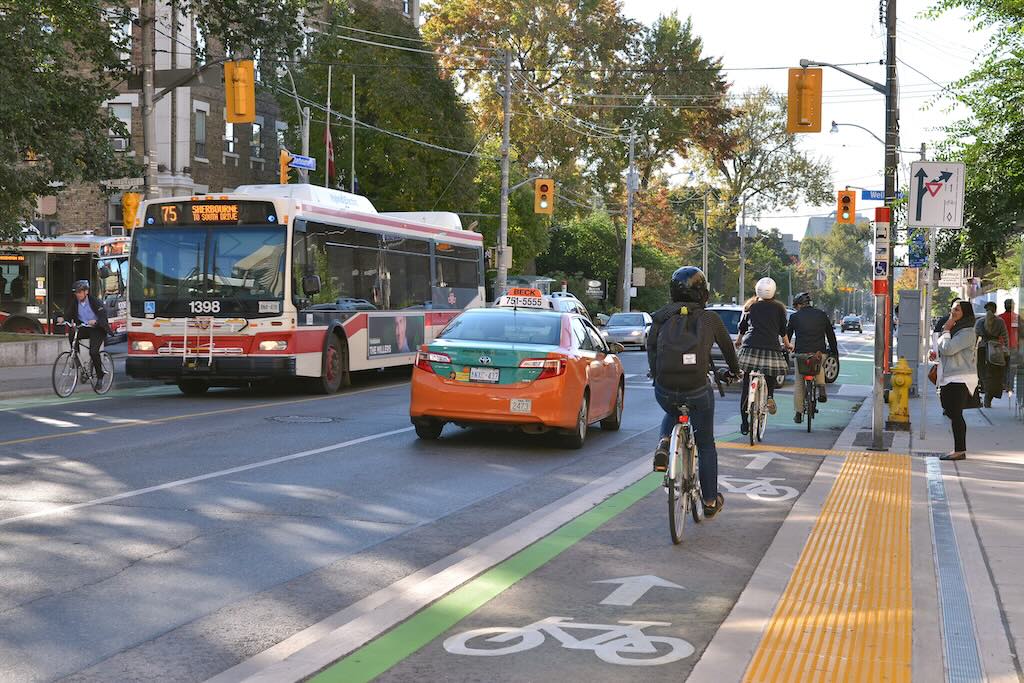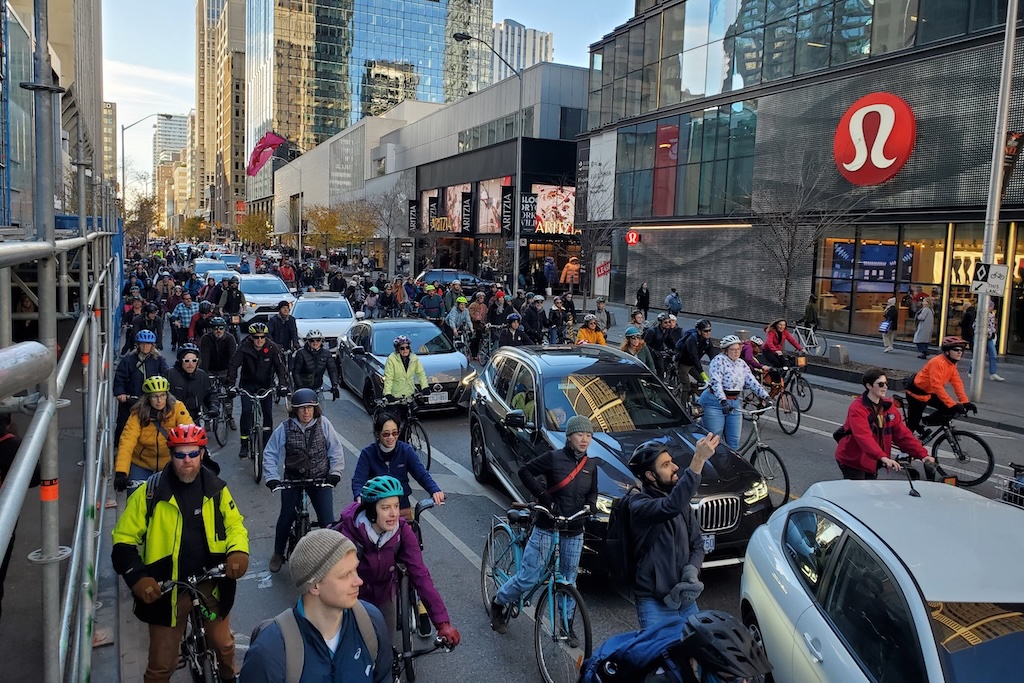Autumn Gear Guide
Find inspiration in our Gear Guide that will keep you out on your bike through wind or rain.
Download NowA new city staff report has revealed that Ontario’s plan to remove bike lanes in Toronto could cost taxpayers at least $48 million. The report, released this week, comes in response to Ontario’s proposed legislation, Bill 212, which aims to eliminate bike lanes on major roads like Bloor Street, University Avenue, and Yonge Street. The report […]
A new city staff report has revealed that Ontario’s plan to remove bike lanes in Toronto could cost taxpayers at least $48 million. The report, released this week, comes in response to Ontario’s proposed legislation, Bill 212, which aims to eliminate bike lanes on major roads like Bloor Street, University Avenue, and Yonge Street.
The report outlines a number of significant costs associated with dismantling the city’s bike lanes, including the loss of $27 million already invested in bike lane infrastructure. In addition to these sunk costs, there would be further financial impacts related to redesigning streets, building alternative cycling routes, and the added construction disruptions that would slow down traffic. City staff warn that these changes would only increase congestion and travel times for drivers, with minimal long-term benefits once the bike lanes are removed.
In summary, Ford’s bike lane removals will, according to a new City Hall report:
– Cost $75 million in direct costs and sunk costs.
– Make traffic much, much worse for at least nine months during construction to remove lanes
– Have minimal long-term impact on car travel times.— Matt Elliott (@GraphicMatt) November 13, 2024
Toronto’s bike lanes, part of a larger plan to improve active transportation in the city, provide public health, environmental, and safety benefits. The report also emphasizes the role of bike lanes in the city’s TransformTO strategy, which aims to achieve net-zero emissions by 2040. Removing these bike lanes could hamper progress toward that goal, especially considering data that shows separated bike lanes help reduce cyclist-vehicle collisions and promote safer, more sustainable transport.
The debate over bike lanes has sparked strong reactions. Mayor Olivia Chow has voiced her opposition to the province’s bill, calling the move costly and detrimental to Toronto’s efforts to improve safety and reduce congestion. She criticized the provincial government for overstepping its authority by interfering with local infrastructure decisions.
In contrast, Ontario’s Transportation Minister Prabmeet Sarkaria has defended the proposed legislation, arguing that bike lanes contribute to traffic gridlock. He claims that only a small percentage of Torontonians commute by bike, and that bike lanes should only be installed where they make sense in the context of overall traffic flow.
As the province pushes forward with Bill 212, Toronto city leaders are preparing to challenge the legislation at City Council. Mayor Chow’s upcoming motion on “Respecting Local Democracy and Cities,” along with support from other councillors, will be discussed in Council later this week. The city is expected to push back strongly against the province’s plan, asking for municipal control over decisions related to bike lanes and other transportation infrastructure.
In the wake of the proposed legislation, advocacy group Cycle Toronto has launched its own campaign to protect bike lanes. The group’s “I Love Bike Lanes” petition, which opposes Bill 212, has gathered over 20,000 signatures in just two months. This shows a strong level of support from cyclists and Toronto residents who believe the province’s intervention is an overreach into municipal affairs.
This petition has quickly surpassed the 13,621 signatures gathered by the Etobicoke-based group Balance on Bloor, which is pushing for a “re-evaluation” of the Bloor West bike lanes. Balance on Bloor’s petition is often cited as a driving force behind the introduction of Bill 212.
Cycle Toronto’s petition highlights growing concern about the potential removal of bike lanes, with many arguing that it would hinder Toronto’s progress toward a more sustainable and equitable transportation system. Cycle Toronto is also advocating for City Council to pass a motion this week to oppose Bill 212 and assert local control over bike lane decisions.

Toronto bike lane
“Not every trip is bikeable, and not every person will choose to ride a bike. But folks riding bikes want to get to the same places as people driving and taking public transit,” says Michael Longfield, Cycle Toronto’s Executive Director. “And to have a network of connected bike lanes that are convenient for short local trips, that includes bike lanes on major roads like Bloor, University, and Yonge. It’s not just about road safety and enforcement. It’s about public health. And the discussions of where bike lanes do or do not make sense are best handled at a municipal level and community feedback.”
In addition, Cycle Toronto is urging the city to continue with its 2025-2027 Cycling Network Plan, which includes important projects like Parkside, Dupont, and Danforth-Kingston. The group has made it clear that it believes the city should stand firm in its commitment to bike lanes, refusing to comply with any provincial mandate to remove them.
With strong public support for bike lanes, Toronto’s fight over the future of its cycling infrastructure is far from over. As the city works to maintain its commitment to safer, greener transportation options, the petition and ongoing debates make it clear that cyclists and residents are determined to make their voices heard.
In response to the Ontario provincial government’s proposed Bill 212, a new advocacy event is set to take place in Toronto on Thursday, Nov. 21, at Matt Cohen Park. The event, organized by a coalition of groups including Cycle Toronto, Friends and Families for Safe Streets, The Biking Lawyer LLP, and Bike Brigade Direct Action!, aims to raise awareness and mobilize the community against the provincial plan to remove bike lanes from key streets in the city. The gathering will focus on advocating for the protection of cycling infrastructure and promoting safe, sustainable transportation in Toronto, as well as pressing for local control over city planning decisions.
This event follows a successful student-led protest last weekend, where more than 1,000 cyclists gathered to demonstrate their opposition to the proposed bike lane removals. The turnout highlights the growing frustration and urgency felt by Toronto cyclists, many of whom see the removal of bike lanes as a step backward for road safety and sustainability.
Don’t tell Dougie! 101 seconds of beautiful people riding their bicycles in support of bike lanes in TO today. #biketo @blogTO pic.twitter.com/7KaC7JpjVz
— ARC (@RespectTO) November 9, 2024
“It was a joyous rally and ride led by Eva & Zev who are wonderful young activists,” said Martin Reis, a Toronto resident and cyclist who attended the protest. “As for removing bike lanes, the Ford gov’t is in for a huge fight. He is just a bully.”
The protest, which was organized by local student activists, serves as a powerful reminder of the strong community support for cycling infrastructure in the city. At the November 21st event, participants will have the opportunity to engage with local leaders, including representatives from the advocacy groups, and help amplify the growing call to preserve and expand cycling infrastructure in Toronto.
Lead photos by Martin Reis.
Find inspiration in our Gear Guide that will keep you out on your bike through wind or rain.
Download Now





Leave a comment